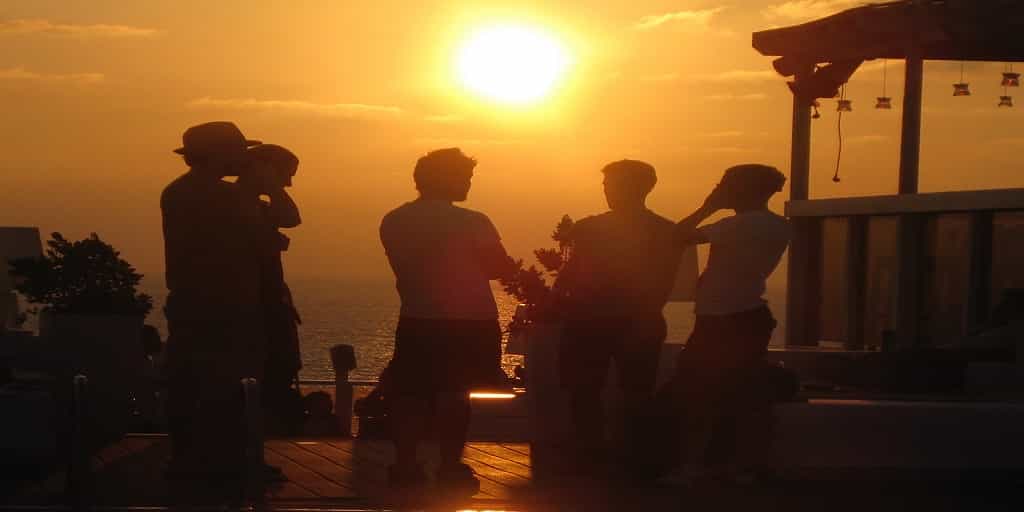Who are these modern Israelis walking past us on our trip?
Today I want to talk about modern Israelis. After all, when you come to visit, you’ll see a lot of Israelis walking around, drinking coffee, living their lives. And obviously average, modern Israelis are different from person to person. But there are some things that make up a typical modern Israeli. So what are they? Who are these people that we see walking down the streets on our trips?
First things first, a native- born Israeli is called a ‘Sabra’ in Hebrew. A ‘Sabra’ is a kind of cactus common here in Israel. The cactus is an ancient plant living in the area for thousands of years, so how does it describe modern Israelis? It is prickly on the outside with all of its thorns, but sweet on the inside. Now there are a couple reasons society chose this name.

First off, the Sabra is a native cactus here, so there is a connection between the cactus born in Israel and the native Israeli. The second reason is because many Israelis can be prickly on the outside, but very sweet on the inside. It can seem at times Israelis are a little brisk, but once they open up, Israelis are some of the warmest people on the planet. You can see how that unfolds when walk down the street, buy your first falafel, and more. You see it when you are invited to the Friday night dinner.
So how do Israelis live a day- to- day life?
Well, their childhood is much like anyone else… school, activities afterwards, and do things other children do. There are a few differences in the school, for example high school students have a major, or a focus of study. They learn general education studies, as well. There are also no school sports either. High school students do sports but not in teams connected to the school.
After graduating from high school, Israelis enlist in the army, known as the Israel Defense Forces, IDF. Men will serve for three years beginning at the age of 18. Women serve for two years, also from the age of 18. There are many units and roles soldiers can serve in, not just the air force or navy, but also as spokespeople, and intelligence. After their mandatory service, Israelis often travel around the world to see a culture different than their own. Many go to Thailand, India, and other parts of Asia. But others travel to South America, and other parts of the world.
Israelis value education a great deal. Once the university year begins students are in full focus on their studies. And Israeli students are very determined at succeeding in their studies. We have the results to show for it. The literacy rate is 97.8%, while 85% of society holds a secondary diploma. In 2012, Israel ranked second among OECD (Organization for Economic Cooperation and Development) countries (tied with Japan) for the percentage of 25- to 64- year old citizens with college education.
And after finishing their education the typical Israeli will go on to find a job in the Israeli workforce. That determination and focus from their university degrees carries on to when Israelis enter the work force. And that is why Israelis have come up with so many inventions, like drip irrigation, instant messaging technology, Waze, and so much more. And boy, do they work as hard as they study. The high tech industry is booming here in Israel, so is the medical field and agriculture. But all of this doesn’t stop, Israelis from enjoying their lives. Israelis go out, enjoy the social scene and explore the rich culture of the State of Israel. For as they say when they toast each other ‘L’Chaim,’ or ‘to life.’ Israelis value a wonderful and celebratory life.
Now, there are two important sayings that you will hear a lot while in Israel. And believe me, they are SUPER important. The first one is the word ‘nu.’ What does it mean? Well, it means ‘so.’ But it isn’t so, as in ‘it is so important to remember this.’ It is used as in in ‘so, what’s new,’ or ‘so, what do you have to say for yourself’. So, ‘nu’… what’s the next saying? Bete’avon, or bon appetite. Why is this so important, that I would say it is an essential part of the ‘typical Israeli’? Because Israelis say bete’avon right as you are taking a big bite into your lunch, and can’t respond because you’re mouth is full.
A study of the Israel Ministry of Foreign Affairs showed that when many thought of an Israeli house, they thought of a cold, gray, concrete house with no one at the door to welcome you at the door. But that is quite the opposite. Nevermind that the architecture is way off, as is the weather, but not only is there someone waiting at the door for you, the whole family is! And they are the ones you have invited to dinner. The most spectacular thing about Israelis is the sense of family that is created by them. When you come to Israel, you feel it this family feeling right away. Everyone goes out of his or her way to make you feel that you are safe. They make sure you know how to get to where you need to be, and you have a place to eat on Friday night.
Part of what is so amazing about modern Israelis we see around us during our trips is their innovativeness and technology, determination and dedication to their work, their love of life and welcoming attitude, and their ancient roots to the land. They are Israeli by being born and citizens here, they are modern in their way of life and living now. They are modern Israelis!

You are never alone in Israel, and you will always have people to turn to for help and support. And that is what is the truly wonderful thing about Israelis. They make you at HOME! I began to discover that when I first came to Israel.
I would like to end this post off with an example of how they do that, even though there are so many more. It began when my family came to visit while I was studying at Tel Aviv University. While on the bus to the center of town, we asked the bus driver which stop we needed to get off of. Not only did the bus driver help us, but almost every passenger on the bus did too! Everyone told us ‘I’m getting off this stop, but you’re getting off in two stops after,’ or ‘I’m getting off this stop, but you’re getting of the stop after me.’ With the help of the entire bus, we were able to get off at the right stop, no problem. And that’s the typical Israeli, one member of one, big family.





